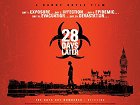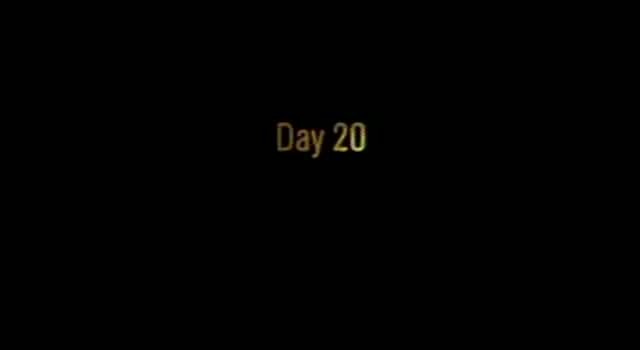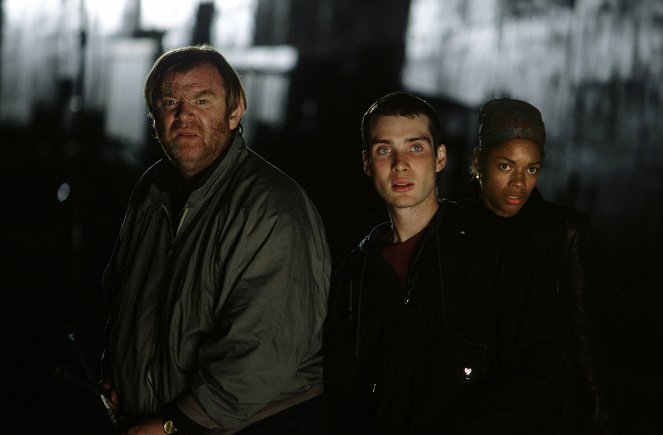Directed by:
Danny BoyleScreenplay:
Alex GarlandCinematography:
Anthony Dod MantleComposer:
John MurphyCast:
Cillian Murphy, Naomie Harris, Megan Burns, Brendan Gleeson, Christopher Eccleston, Alex Palmer, Christopher Dunne, Luke Mably, Ricci Harnett, Noah Huntley (more)VOD (1)
Plots(1)
When a group of chimpanzees freed from a research facility goes on a ravenous rampage, the virulent disease they carry quickly becomes a horrifying human pandemic. And when a bicycle courier (Cillian Murphy) awakes from a coma in a deserted London hospital, he finds himself in a post-apocalyptic world where survival of the fittest means staying a few steps ahead of the infested... who create more of their own by ravenously attacking the fit. (20th Century Fox Home Entertainment)
(more)Videos (2)
Reviews (10)
Woah. This the first time I've had to write the same review a second time. Server crashes are almost unheard of here at FilmBooster (I had to complain somewhere :-). The most impressive scene of the picture 28 Days Later is undoubtedly Cillian Murphy's pilgrimage through depopulated London, which is basically the second scene in the movie. After that, it's a post-apocalyptic movie about survival and human relations, crossed with a not-so-normal zombie horror movie. The flimsy screenplay is a bit of a problem (it can't decide what type of movie it wants to be), but Danny Boyle saves it with visual touches (once even with an oil painting) and unconventional camerawork.
()
Raw British horror that replaces slow zombies with fast infected people, influencing this horror subgenre for many years to come. The casting of Cillian Murphy in the main role was an interesting move, his face has both boyish and girlish features and his transformation from “someone who’s being dragged on” into “the one that saves everybody” was also interesting. Great.
()
First of all, I was surprised that Boyle would venture into something like zombie (or rather, contagion) horror. But as such, I understood it at the beginning and therefore wondered about the inappropriately placed scenes, unsuitable for this genre. Even the unusual musical score suggested that something was amiss. And in the second half, it became clear. Against the backdrop of the struggle for survival, Boyle attempts to portray the behaviour of people in a liminal situation, when they have a choice between retaining a shred of their humanity or being overwhelmed by an instinctive desire to survive at any cost, even at the cost of harming others, and he really doesn't give people the best report card. One of the soldiers in the film says that people killed each other before and will kill each other in the future, in that sense, they are not really that different from the infected. The "infected" themselves are very reminiscent of the aggressive running zombies from Snyder's remake and can occasionally cause a few hear attack situations.
()
Danny Boyle won over audiences with Shallow Grave and cemented his reputation as a talented filmmaker with the cult classic Trainspotting. Naturally, expectations were high for his next project, but unfortunately, it didn't quite live up to the hype, although I still give it 4 stars. It's a film that approaches its subject matter too timidly and indecisively. The pacing of the film fluctuates, the screenplay is awkward at times, and it ends with a disappointingly happy ending. Within its genre, it's still above average, but from the director of Trainspotting, I simply expected more. Overall impression: 70%.
()
Though, strictly speaking, 28 Days Later should not be ranked among zombie movies, given that the origin of the apocalypse it depicts would rather place it among contagion films, it draws directly from the tradition of zombie-apocalypse movies on many levels. Furthermore, its international box-office success had a fundamental impact on the revitalisation of the zombie genre in the new millennium. The legacy of zombie movies in the Romero tradition is fully evident here, as the monsters and the apocalypse associated with them serve both as a catalyst for a drama involving a handful of survivors and as a mirror held up to contemporary society and its ills. Danny Boyle and Alex Garland focused specifically on the global phenomenon of rage, which they see – at least in England – as the result of frustration arising from unfulfilled ideals about the value and importance of the individual in a democratic society. The use of digital cameras highlights the immediate tension of the characters, while also serving as a reminder of the mass deployment of security cameras, which are intended to protect people, but only contribute to anxiety and the feeling of diminished privacy, as well as to rising fear in the population brought on by the released footage of criminal acts being committed.
()



Ads